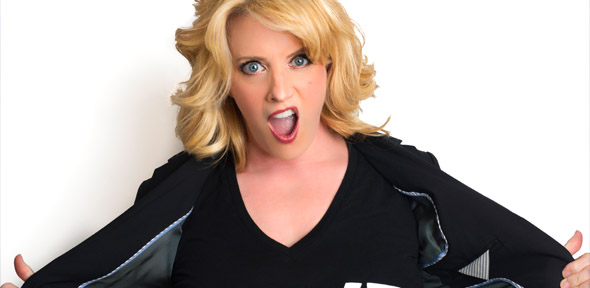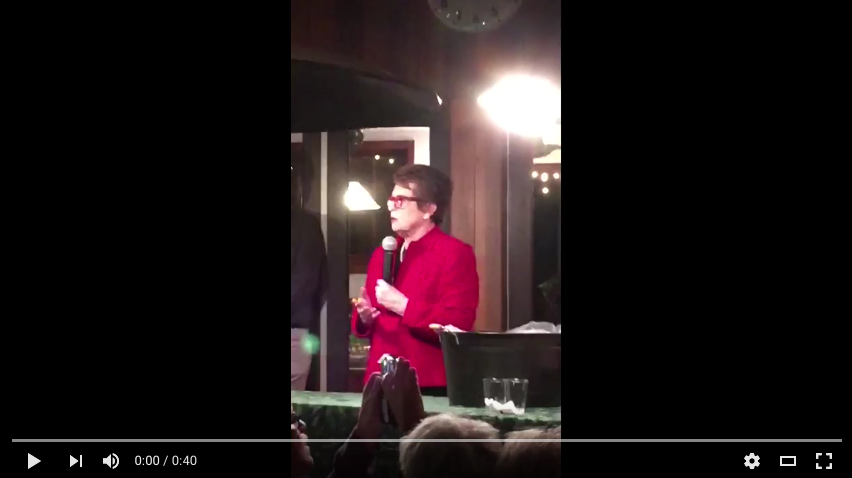Originally published by Watermark Online on 11/18/2015.
By Jeremy Williams
The old adage goes “dying is easy, comedy is hard,” but in 1990 being an out and proud gay stand-up comedian was impossible. Enter Suzanne Westenhoefer.
Westenhoefer got into stand-up on a dare and since then has been a pioneer in LGBT comedy. She was the first openly gay comic to appear on television in a 1991 episode of the talk show Sally Jessy Raphael entitled “Lesbians who don’t look like lesbians.” She was also the first to have her own stand-up comedy special on HBO and Comedy Central and the first out comic to appear on David Letterman.
Westenhoefer is now coming to St. Petersburg to perform her not-so-subtle brand of stand-up at The Palladium Dec. 13. But before she heads to the Bay area,Westenhoefer spoke with Watermark about those early days and where comedy is at today.
WATERMARK: When people talk with you about the early days and say comedians like you and Lea DeLaria helped to lay the ground work for LGBT comedy, what kind of feelings does that bring up in you?
I think the weirdest part, and I don’t want this to sound like sour grapes, but everybody in our culture, whether they’re gay or straight, think gay comedy started with Ellen DeGeneres. Meanwhile, I had been out and professional and doing it for six years by the time she did that and Lea for like 10 years. So you say “how does it fell to lay the ground work” but we don’t feel it because we are not acknowledged in that way. That’s not how it works.
Is it hard to be asked those kinds of questions?
I mean the truth is Ellen was enormously famous, which means that her soapbox, her voice, was so much bigger than I could have ever had. She was a movie star. She was a television star. She had her own show; she had all that so when she came out everybody heard it. When I came out doing stand-up in 1990 in New York City 20 people heard it each time [laughs], so it didn’t have the same exciting effect.
Even though Ellen was the most recognized, you and Lea had a lot of the firsts for an out, LGBT comedian. Lea was the first openly gay comedian to appear on a late night show when she was on The Arsenio Hall Show.
Yeah and I was the first openly gay comedian on Letterman and let me tell you something, there’s time between Lea doing Arsenio [in 1993] and me doing Letterman [in 2003]. It wasn’t like Lea got to do Arsenio and then everybody got to do it and P.S., there was no openly gay comic on Letterman after I did it.
Letterman really didn’t have any on after you?
I mean he had Rosie O’Donnell and he had Sandra Bernhard, but he never brought out some unknown, openly gay comic. At least with Arsenio, after Lea he had Kate [Clinton] on and few of the guys on and that was a big deal. It’s not like me and Kate and Lea got to do these things and the gates were just cut open and everyone got to run through. That didn’t happen until Ellen and Rosie, when the famous people did it. That’s just how society works; we want to see the famous people do it first.
I think it goes back to people are more accepting of it if they know someone who is gay and Ellen and Rosie were in their living rooms every week and people felt they knew them.
Yeah and it counted more for them. Here’s the thing, I don’t want to speak for Lea and Kate but I’m sure they feel this way, we had a job to do and ours was about activism. For me it was about activism, I wanted the world to be different. So I stepped up and said I’m queer, in 1990, and everybody got all scared and weirded out.
I wanted to ask you about something I read, did you really get started in comedy on a dare?
[Laughs] It’s true. I moved to New Jersey, just outside of Manhattan, after college to be an actor. After 10 years I was a bartender, I was a damn good bartender too, and this guy said to me, he was a comic in New York, he and my girlfriend at the time dared me to get up in front of a straight audience for a competition and do comedy just like every other comic only say girlfriend. Say my lover, talk about my girl, and at that time no one had done that, so I did. At that time there were a handful of gay comics but none of them were working the straight clubs. They were doing it for Pride or doing it at drag shows, so it was like a big deal that I got up there and did it.
How did the audience respond?
They were great. I guess I was funny ’cause I won the competition, I won $25. Afterwards, even comics who were gay would come to me and say you need to stop doing that. It’s gonna ruin your career, you’ll never be able to get work and you’ll never be able to get ahead, you’ll never get on TV. Everyone told me that; gay comics, straight comics, managers at clubs, agents, all of them. In a way they were right. It kept me from getting as far as I might have been able to get if I had waited, but I don’t care. That’s not the point of my life. That’s not my journey. I got to go to bed with me every night and be proud of what I was doing. I’m not lying about who I am.
Another thing I read about your comedy is that you don’t script your act out at all.
Well, yes. What happens is I go out there and I say something and if it’s funny and I hear the audience laugh I try to make a note of it after the show and then the next few shows I’ll say it again and if they’re still funny I’ll add to them, I don’t write it ever, I do it all up on stage. I may say something, a small joke while I’m in St. Pete and six months from now it will become this huge thing that take up 30 minutes of a show. I see that the audience likes something and my brain just goes to work on it. I don’t know how to write my own stuff. I can write for other comics, I just can’t seem to do it for myself.
That explains why your comedy is so broad as opposed to many comics who focus on one type of comedy; either political or pop culture or personal stories. Do you have a blueprint of what kind of things we can expect when you’re here in St. Pete?
You can’t plan. What might seem funny to you and me right now is gonna seem old and lame by the time the show comes around. Rubio, again? [laughs] Ugh, Ben Carson, isn’t he dead? So what I do, when I get to the hotel I turn on CNN, I open a newspaper and I just flood myself with what’s going on. I do that all the time, and I read Vanity Fair and I read Entertainment Weekly and I read the New York Times magazine. Then I have my own stuff and I talk about my life or my cat or my girlfriend, I mean there’s so much.
It seems like everyone today has gotten very sensitive and politically correct. What’s your take on that?
As a comic, and I think a lot of comics would agree with this, we cannot pay too much attention too much to political correctness because we’re the court jesters. We’re supposed to say that thing you’re not supposed to say. I mean, you can’t be an idiot about it, but I think it’s the comics’ job to push that anyway. It’s my job to get up there and say so-and-so is a dick. I also don’t walk myself into a lot cause if I don’t believe in it then I’m not gonna talk about it. You can’t say something just to be edgy. There are comics who do that and it’s boring.
Stand-up historically has been a difficult arena for female comics to break into. Is it still seen as a “man’s game” or has it gotten better?
It hasn’t gotten better, but I’ll tell you that people like Amy Schumer are forcing it to get better. She’s going out there and saying, “I’m gonna talk about being a slut and I’m not gonna let you mock me about it. Men can go out there and talk about being with a different girl every night and you love it. I’m gonna talk about having sex with a different guy every night and I’m gonna make you love it and you’re gonna be fine.” That’s what you have to do. I’m really proud of her and I’m really into what she’s doing.
What is it that keeps you getting up on that stage, each night, after all these years?
The audience. I get up there and I’m talking for 90 to 120 minutes and they are listening and laughing, I can’t even begin to explain how that feels. It’s the most extraordinary feeling. Every comic, no matter what they move on to, always comes back to it. Well, except one, and comics still talk about it today, and that was Steve Martin. Every other one, no matter how big they get, always come back to stand-up. It’s just such a fucking drug.




